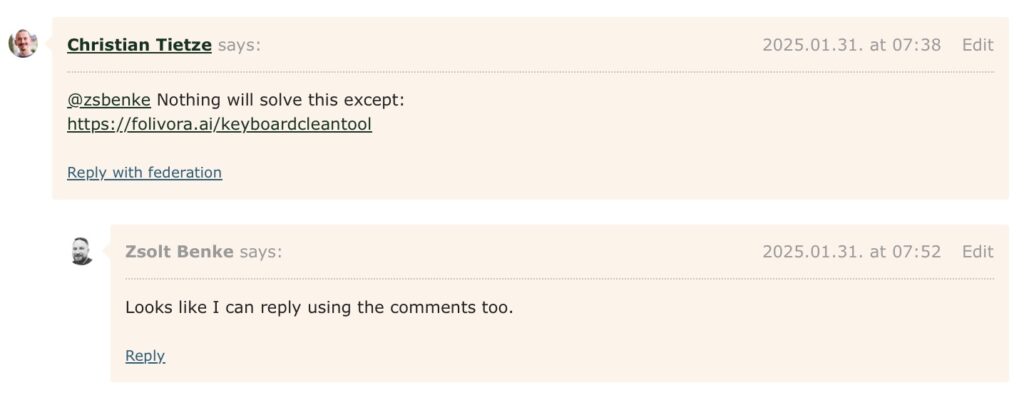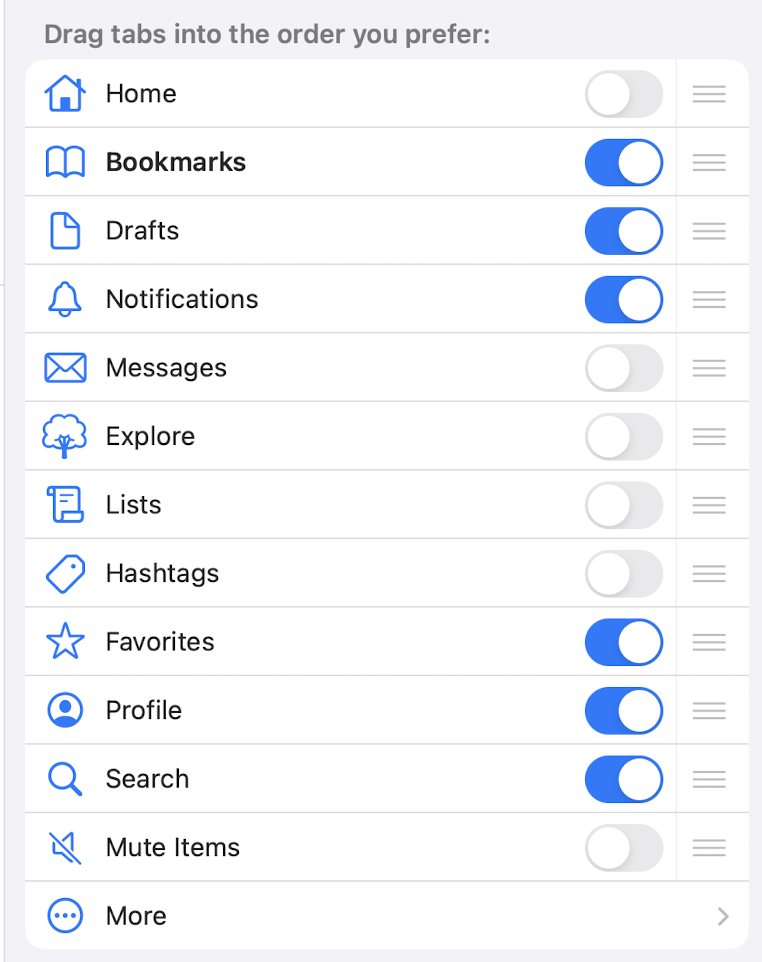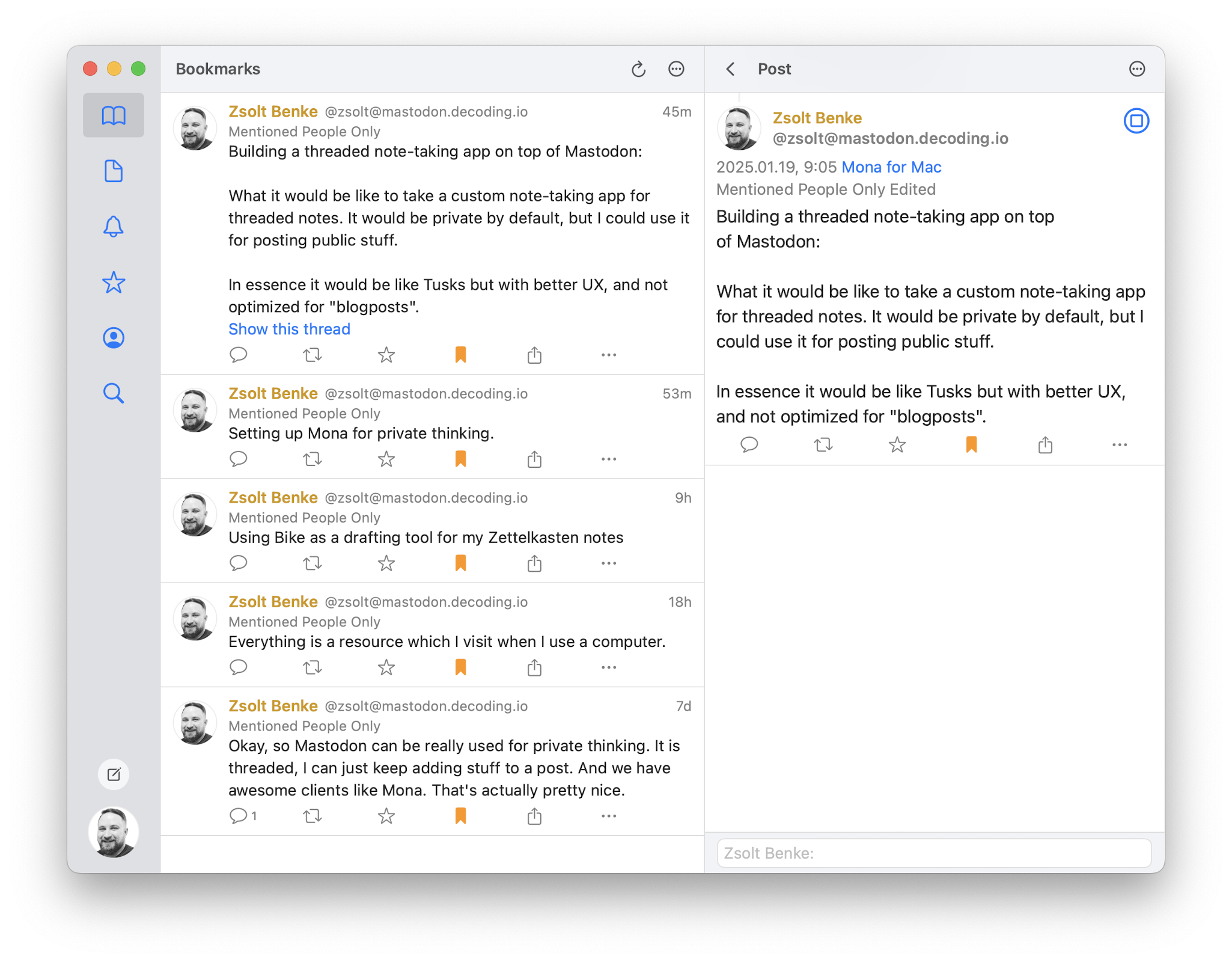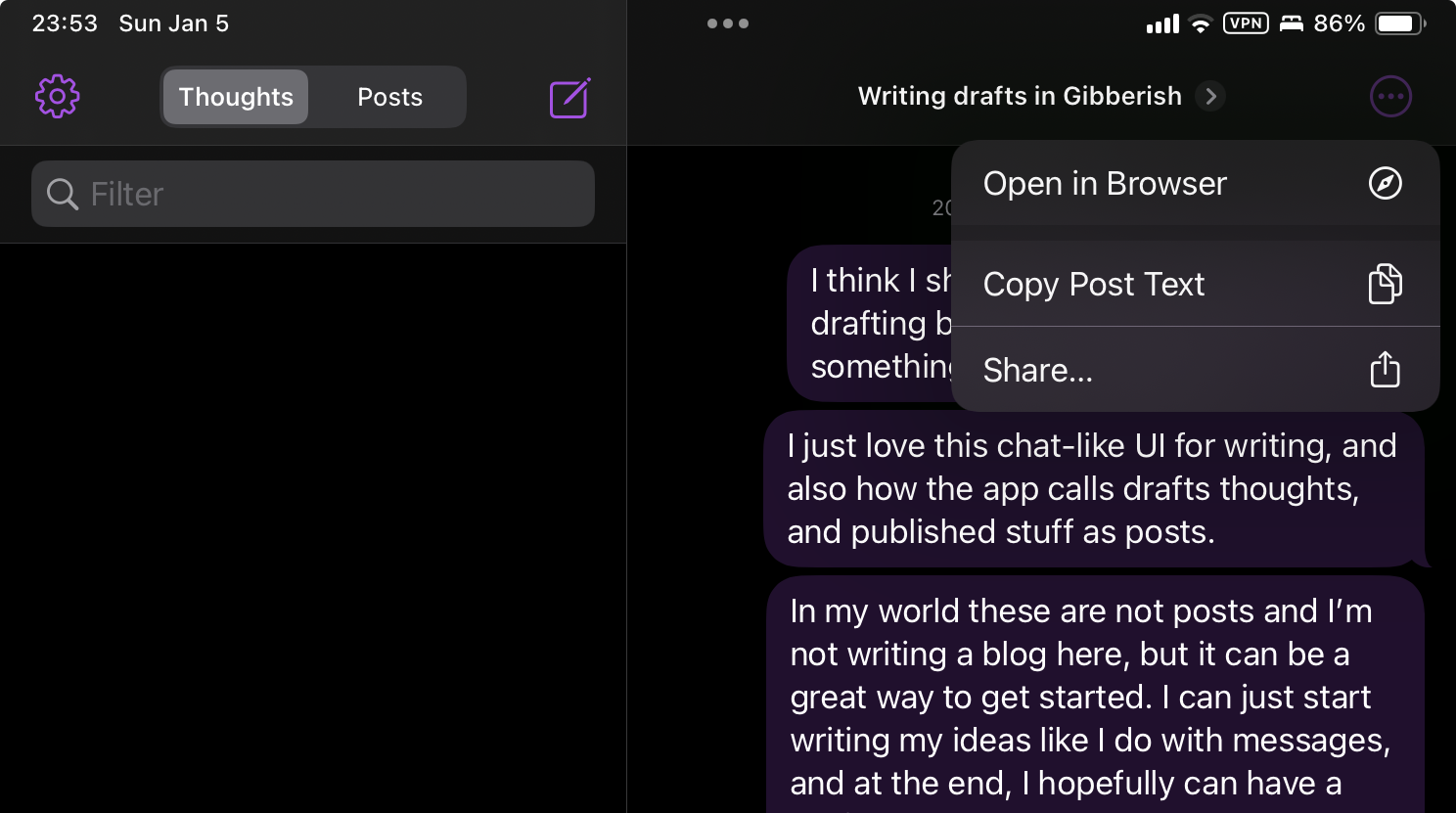I’m not a big fan of Arc (it just overcomplicates the browsing session), but if you want something similar based on Firefox, then the Zen browser could be interesting.
2025.02.17.
2025.02.04.
Tapestry
I like Tapestry. It’s going to be a great app, and people seem to like it. No Mac app for now though.
I’m just not sure why everyone was complaining about Reeder 5 when it was released doing basically the same thing.
2025.01.31.
I just realized that the ActivityPub plugin for WordPress does Fediverse replies inline too. Pretty nice!

2025.01.24.
Bookmarked “Sublime Feed”
The first RSS feed reading service that’s tailored for a more calm approach that doesn’t make you want to scratch your eyes out. Embrace the FOMO and go with the flow of life.
A heavily HEY-inspired RSS reading service.
2025.01.20.
Read “The PC is Dead: It’s Time to Make Computing Personal Again”
How the rise of internet surveillance, algorithmic polarization of social media, predatory app stores, and extractive business models have eroded the freedoms once promised by personal computers.
In the short term, we can do things like support open projects like Linux, support non-predatory and open source software, and run apps and store data locally as much as possible. But some bigger structural changes are necessary if we really want to launch the era of Personal Computer 2.0.
All is well in Micro Land! I have my books to read, my locally stored music to listen to. My family to interact with. We have not watched the “news” since November. The house is quieter, the stress is lower.
2025.01.19.
Setting Up Mona for Private Thinking
Since I started to thinker with private Mastodon threading, I’ve been experimenting with using Mona as a private note-taking app.
Hiding the Home tab from Mona makes the app feel more private. I only left the following tabs available because I want to optimize it only for my posts.

I read other people’s posts in Reeder; I use Mona for threading and journaling about ideas privately (and keeping up with my notifications and mentions).
Another thing I did is to replace the ⌘N keyboard shortcut with a custom Keyboard Maestro macro which creates private posts by default. This way, I can work on my threads in a private manner, but still see my notifications if I post something public.
These changes make Mona a note-taking app with built-in discussion features. I don’t know if we have any other app like this.
This is one of the things I love about the Fediverse. In essence, it is just a public place where we post things, but we can make weird mashups on top of it, like a note-taking app.
2025.01.16.
Using Mastodon’s threads for thinking out loud
A few days ago I wrote about getting back to Mastodon, and it’s becoming an unexpected part of my workflow. While I initially set up my instance just to syndicate my blog posts, I found myself using it in ways I didn’t anticipate.
Remember how I loved Gibberish’s chat-like UI for drafting ideas? Well, Mastodon’s thread format accidentally became my new space for thinking out loud. I create private threads where I can ramble about stuff, just like I used to do in Gibberish, but with some nice advantages:
- Mastodon is completely open, so I can:
- Run my own instance
- Control my data
- Build whatever I want on top of it
- The clients are surprisingly good
What I find fascinating is how this turned into a lightweight note-taking system. I write posts for myself, bookmark them, and can easily go back to review my thoughts. It’s like a poor man’s Zettelkasten, but the thread format adds this natural, conversational flow to my thinking process.
The best part? Mona’s sliding pane UI feels like it was accidentally designed for this kind of short-form note-taking. The way you can slide between connected thoughts makes it natural to build on ideas. I treat my posts as append-only – while I could edit them, I choose not to. Instead, I add new posts to clarify or expand on my thoughts. This self-imposed constraint helps in capturing the evolution of ideas.
I’m finding myself using Mastodon more and more for drafting ideas, alongside Gibberish. Not what I expected when I set up my instance, but it’s becoming a nice addition to my workflow.
2025.01.06.
Bookmarked “Mastodon Docker Setup – most complete and easiest guide online”
I used this guide (with a little help from ChatGPT) to setup my Mastodon instance.
In this guide we will only focus on using the prebuilt images from Docker Hub.
I just love the Gibberish UI for drafting ideas
I subscribed to Gibberish again. It’s a pretty simple app with a weird idea: you can write blog posts by typing out your thoughts in a text messaging-style UI. Each message represents a paragraph.
Why that’s great? The messaging UI somehow triggers me to spit ideas into a chat thread, which I can revise later. Well, the “revise later” part is not the strongest suit of Gibberish, but creating the first draft is the best I found for me.
I just love this chat UI for capturing ideas. It’s not coincidental that people text themselves a lot. Also, it just makes sense how the app calls drafts “thoughts” and published stuff “posts.” I love small touches like this.
Though these are not posts, and I’m not writing a blog here, since I have to publish a post to get the “Copy Post Text” menu working, I figured, why the hell not? I’m not going to share the URL of my Gibberish “blog” since it is just a side effect of using the app “wrong,” but because I love this way of drafting things, I’m going to keep it around. I don’t care if people find it.

Since I’m using the app just kinda right (I don’t care about the blogging part), I wish it was just a private thing that syncs over iCloud (or whatever) with better support for exporting my “thoughts” into other apps like Drafts. As mentioned, I only publish my posts there to get the “Copy Text” option working.
So, essentially, I just want an app that I can use to ramble about stuff and then export to revise the content somewhere else. Gibberish would be an awesome app for collecting thoughts without having a blog behind it.
2024.11.21.
Bookmarked “Backup Brain”
This is the ideal blog format for me. A list of daily notes grouped by day.
Read “Pluralistic: Tabs give me superpowers (25 Jan 2024) – Pluralistic: Daily links from Cory Doctorow”
Most of the internet is still on the web, which means it can be bookmarked, which means that it takes me one second to add it to the group of things I’m staying on top of, and one second to remove from that group. I get up in the morning, middle-click the “unfucked rota” item in my bookmarks pane, make a cup of coffee, and then sit down and race through those tabs, close-close-close.
It takes less than a second to scan a tab to see if it’s changed (and if I close a tab too quickly, the ctrl-shift-T “unclose” shortcut is there in muscle-memory, another habit). The whole process takes between one and 15 minutes (depending on whether there’s anything useful and new in one of those tabs).
I like the idea of using tabs as a list for next actions; however, my main concern with this approach is that it doesn’t clarify why I need to open a specific tab. It feels like a variation of the “Waiting for” list, which can serve a similar purpose. I can access this list daily, quickly scan it, open links from the task notes, and even update it with new information.
It’s interesting that Cory discusses how he utilizes the “Waiting for” list in another article.
2024.10.03.
Read “Re: How I find interesting blogs | Loren’s Blog”
I’m relatively new to the indie blogging, so I’m always on the lookout for new blogs to follow. What works best for me is when I come across a blog that references another one I almost always click through, check out the “About” page, and skim the article archives to see if their content interests me. If it does, I’ll add their blog to my RSS feed.
This is exactly what I do as well. I have never used any directory to find interesting blogs—okay, maybe once—but the point is that linking to other people is a natural way to discover exciting things.
I love it when I have ten tabs open related to a topic and browse the web as we used to.
Using the web for discovery feels like how time was presented at the end of Interstellar. The past, the future, and the now exist all at once, and you can go anywhere on the timeline.
2024.07.07.
Read “Blogs as Modern Commonplace Books”
I rarely feel an urge to write about things I fully comprehend. More often than not, such regurgitation feels like a chore. I might do it to spread awareness on an issue, but rarely for its own sake.
Instead, I find it more exciting to write about things I don’t yet fully understand, where new information has become available or where I want to clarify my thinking. In other words, to “write so that I know what I think,” or to “write what I need to know.”
Read “What We Give Up”
Whatever regulation that required these kinds of policy-change notification emails greatly failed us. A notification is not enough. If a company changes their policies, individual user data should be made completely inaccessible to that company until that user explicitly agrees to the new policy.
Yes, this should be the default. However, companies would heavily exploit a rule like this, like they abused the cookie consent UIs on the web.
2024.04.01.
Read “Digital Homesteading”
If your passion or livelihood depends on a set of tools or capabilities, don’t rent those tools from someone who can deny you access or claim your output at any time. Own your tools. Be a digital homesteader.
2024.03.18.
Read “The best blog posts are genuine”
This is what differentiates blogs from newspapers, journals, and academic writing. This is supposed to be a space where anyone and everyone can express themselves. I’d hate for someone to be put off sharing something because they don’t meet a hypothetical bar of wit.
This is something I also talked about couple of days ago.
2024.03.17.
Playing around with Tailscale
I’m playing around with Tailscale, but I’m not sure about the privacy aspect of being on a VPN all the time. I want to sync DEVONthink and OmniFocus using a WebDAV server on my Mac mini, but running Tailscale 24/7 raises some questions.
- Is it really end-to-end encrypted?
- Does all traffic go through the VPN?
- What about network issues when using a VPN? I’ve seen some connection drops in the OmniFocus sync logs when I used my Mac mini as a sync server.
I love the idea of having my private network of devices available everywhere. But I don’t trust random companies with my data, so I want to do my research before I start to use Tailscale with all my devices.
2024.03.16.
Read “Building a Stronger Web Without AI”
If we all build our own places, we can live the dream of the web, now. We can create the web that was always meant to be. By connecting our websites together by—spoiler alert—linking to the people who inspire us, we build a stronger web than a search engine can index, one that won’t be littered with content we can’t control.
Amen!
2024.02.22.
The new version of the ActivityPub WordPress plugin lets me reply to comments coming from Mastodon and federate them back as standard replies. I just wanted to install an instance this morning to have a profile that I can use to reply to incoming comments, but this one is way better.
Again, you can follow me on Mastodon by searching for my profile (zsbenke@decoding.io) from your instance.
2024.02.18.
Building my own web
I’m very disappointed after reading comments on this article: How Twitter’s descent into chaos is paving the way for a new web
I don’t want to see this divided mentality (especially politics) under articles that are talking about cool indie projects. The mainstream web has gotten into a state where people just inject politics into everything. If I want to have a place that I like, I have to build my part of the web.
A Zettelkasten and a blog can help with that. I can make my blog cozy, write about what I like, and then browse that from time to time to rediscover things.
2024.01.01.
Bookmarked “Minus”
Minus is a finite social network where you get 100 posts—for life.
2023.12.30.
Bookmarked “Tech Independence | Derek Sivers”
2023.12.24.
Read “Jack Baty | I won’t be joining RSS Club”
Mostly, though, it’s that blogging itself has enough problems with adoption. I’m not sure it’s a great idea to be “hiding” blog posts. Good blogs are hard enough to find these days. Why limit your writing to only those people who’ve already discovered you?
These are exactly my thoughts about this RSS Club thing. I don’t want to make my readers search for hidden content on my site (there is hidden content on my site, but it won’t be accessible by RSS), I want them to find my stuff easily.
It is already annoying that social networks, like Twitter, hide otherwise free content behind a login page; bloggers shouldn’t force readers into subscribing to something (maybe this is why I wouldn’t say I like newsletters too).
If you enjoy hiding your content, that’s fine, but we have a sparse number of good blogs these days. I want good content to be more discoverable, not hidden behind login pages and RSS feeds.
2023.12.19.
Read “Getting an Unread Badge Count For the Docked Gmail Web App in macOS”
2023.12.16.
What’s up with Twitter these days?
I read: What should I do with my Twitter:
I’ve been trying to figure out what to do with my Twitter/X account. I don’t want to leave it dormant, because the current policy is to reclaim usernames from accounts that don’t post, which creates a risk that someone will come along and claim to be me later on.
I was worried about this, but I don’t care anymore.
Then… The idle elite:
At this point, if you’re still on Twitter, it might be time to accept a hard fact about yourself: there’s not a single thing that its leadership could do that would push you off the site. Since the takeover almost a year ago they’ve fired everyone who cared, they’ve invited back 4chan, kiwifarms, and sundry other threat actors, they’ve started revenue sharing with the rape peddlers and insurrectionists, they’ve given priority lanes to every paying NFT and AI grifter, and even outright blamed the jews for their bad finances. That’s not even close to an exhaustive list!
Twitter is the worst “social media” site you can use nowadays. Look at what is happening with Threads and Mastodon over here.
I still don’t trust Meta, though.
2023.12.06.
Read “Web Apps Are Better Than No Apps”
Since web apps can’t just use the components provided by the operating system, they have to recreate everything from scratch. And this creates a lot of burden for developers and, I think, lowers the quality floor. Creating beautiful, compelling apps is possible, but it requires so much work. People building native apps get it all “for free”. In fact, this could be one of the reasons Apple still has such a vibrant ecosystem of great artisanal apps since developers can build most things out of nice ready-made components.
Well, yeah!
2023.12.04.
Read “How I Take and Publish Notes – Jim Nielsen’s Blog”
Jim writing about his reading note publishing process:
I like to let my notes sit for a couple days (or even weeks). I find that if I come back to a note and still find it interesting/insightful that means it’s worth keeping, so I put in the work of cleaning it up and publishing it.
I don’t do this. If I see something interesting, I usually publish it immediately (like this post). On the other hand, I have a Zettelkasten site, which contains more in-depth notes that are also coming from reading notes. However, that site is so new that I haven’t really published anything that counts as reading notes there yet.
2023.11.27.
Read “Neil Gaiman’s Radical Vision for the Future of the Internet – Cal Newport”
Between 2012 to 2022, we came to believe that the natural structure for online interaction was for billions of people to all use the same small number of privately-owned social platforms. We’re increasingly realizing now that it was this centralization idea itself that was unnatural. The underlying architecture of the internet already provides a universal platform on which anyone can talk to anyone else about any topic.
2023.11.23.
Publish bookmarks from DEVONthink
-
I’m messing with my bookmarks today.
-
I keep a lot of cool articles in DEVONthink as my central repository, but I also want to share some of these links here.
-
I’m testing a simple workflow for this using a DEVONthink smart group, which shows me all my bookmarks from my Decoding database that aren’t published yet.
-
I’m using DEVONthink custom metadata to mark a record “published”.
-
-
This workflow desperately needs automation, but I want to start as simple as possible and see how it works in practice.